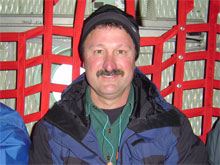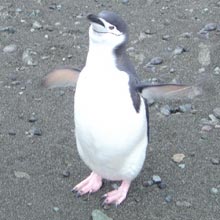King George Island, Antarctic
December 11, 2005
William Hanshumaker
Oregon State University
Public Marine Education Specialist
Extension Sea Grant Faculty
Weather: Low clouds with limited visibility, intermittent snow flurries
Winds: Variable between 10-35 knots
Seas: Three to five foot swells with whitecaps
Our final destination today was Punta Arenas, Chile, but there were several challenges. The weather, especially the sea conditions, was not favorable to using the open Zodiac to disembark. Because of the safety concerns, the commander of the Korean base was reluctant to commit his small boat. The captain of the Yuzhmorgeologiya had the option of taking us directly to the Chilean base, but there was already a ship moored in that end of the bay, complicating navigation. And finally, the Hercules C-130 was scheduled to arrive at 2:00, and we were uncertain as to whether we could get to the Chilean base in time.
After revising our plans several times because of the changing weather conditions, the Korean crew and the Zodiac were loaded on the Yuzhmorgeologiya and we slowly steamed over to the Chilean part of the bay. The other vessel that had been there departed, and the Zodiac easily transited the short distance to the shore. Unfortunately, there wasn't time to deploy a hydrophone to gather some real-time acoustics. We had hoped to use the small boat to obtain underwater sound files away from the Yuzhmorgeologiya's ship noise. We just have to wait until next year when we recover the sound files from the autonomous "Haruphones" that we just finished deploying.
The Hercules' departure time was postponed until after 8:00 PM so we enjoyed the hospitality available in the lobby of the Chilean hotel. This included watching their televised national election results. We had previously rescheduled our air flights to comply with the Chilean restriction of civilian flights on election day. When we first arrived in Punta Arenas, the election campaign was in full swing, with large posters and political demonstrations everywhere. I followed these proceedings with interest and am happy to report that democracy is alive and vibrant in Chile. They will be holding their run-off election in January.

Bill Hanshumaker on board the C-130 (with a “deer caught in the headlights” look). Click image for larger view and image credit.
The return flight on board the Hercules C-130 was an experience of extremes. The airplane seats consist of a four long metal benches with nylon webbing for back support. We were warned that the plane would be unheated, so we dressed in our warmest clothing. But depending on your proximity to the two overhead heat vents, additional clothing wasn't necessary. I had to remove my jacket, hat and gloves, but in spite of heavy socks and insulated boots my feet were very cold.
There are only a couple of small windows on the Hercules, but the most uncomfortable part of the flight was the noise. Everyone had to wear earplugs, but they only served to muffle the ambient noise from the aircraft. Conversation was impossible, even given the close proximity of our seating. So with varying degrees of success, everyone tried to sleep.
One of the main advantages of the C-130 is its superior flight speed. While it took us almost 3 hours in the chartered DHC-7 to arrive at Antarctica, the flight time back to Punta Arenas in the Hercules was a full half hour shorter. We stayed an additional day recovering in Chile, before boarding our series of long flights back to sunny Oregon.
There have been subsequent submissions to this Web site. Please explore the interviews with Dr. Haru Matsumoto and Sara Heimlich who shared some of their thoughts about this expedition and provided advice for students interested in pursuing marine science careers.
Sounds of the Southern Ocean will be sending several reports from Dec 3 - 13. Please check back for additional logs from this expedition.
Sign up for the Ocean Explorer E-mail Update List.













